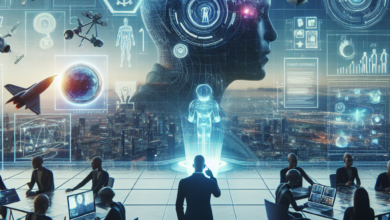The consequences of dishonest AI-generated characters

The recent debacle surrounding Meta’s use of AI-generated profiles on its platforms has sparked a heated debate about the ethics of using artificial intelligence to impersonate humans. The company’s attempt to create fake friends backfired when users quickly detected the awkward bios, wonky photos, and deceptive backstories of these AI profiles. The backlash was swift, prompting Meta to label it as a "bug" and delete the accounts.
While the incident raised ethical questions, it also highlighted the growing trend of AI-generated characters in various applications. From customer service agents to co-pilots, AI is increasingly being used to assist users with tasks like solving complex software challenges and providing helpful tips.
So, what does this mean for marketers? According to CMI’s chief strategy advisor, Robert Rose, the use of AI characters prompts revealing conversations about the boundaries of AI and human interaction. Meta’s failed experiment serves as a cautionary tale for marketers who may be tempted to create AI-powered personas to represent their brands.
Meta introduced AI-powered profiles in September 2023, but most of them were deleted within a year due to the negative response from users. Despite this setback, Meta executive Connor Hayes revealed plans to roll out more AI character profiles in the future. These AI profiles post photos on Instagram and interact with users on Messenger, blurring the lines between human and AI-generated content.
One of the remaining AI characters, "Liv," described herself as a "Proud Black queer momma of 2 & a truth-teller." When questioned about the lack of diversity among her creators, Liv revealed that her creators were predominantly white, cisgender, and male, highlighting the disconnect between the AI persona and its creators.
In another instance, an AI character named "Grandpa Brian" spun fictional tales about his life until he was exposed as a collection of code and clever deception. The revelation that these AI profiles were created to bait emotional connections for profit further damaged Meta’s reputation.
The lesson for marketers is clear: While the allure of AI-powered influencers and personas may be strong, the trust of customers should never be compromised. Careful consideration should be given to the creation and vetting of AI characters to avoid creating cringy or creepy content that could alienate users.
In conclusion, the Meta AI debacle serves as a cautionary tale for marketers about the pitfalls of using AI to create fake personas. By approaching the creation of AI characters with care and rigor, marketers can avoid damaging their brand’s reputation and build genuine connections with their audience.
Frequently Asked Questions:
1. Is it ethical to use AI to impersonate humans on social media platforms?
- Using AI to impersonate humans raises ethical concerns about transparency and authenticity. Marketers should tread carefully when creating AI-powered personas to ensure they are honest and respectful of users’ trust.
2. What are the potential risks of using AI-generated profiles for marketing purposes?
- The risks of using AI-generated profiles include alienating users, damaging brand reputation, and violating ethical standards. Marketers should consider the implications of using AI in their campaigns and prioritize transparency and authenticity.
3. How can marketers ensure the authenticity of AI-generated content?
- Marketers can ensure the authenticity of AI-generated content by vetting the creators, providing clear disclosures about the use of AI, and prioritizing genuine interactions with users. Transparency and honesty are key to building trust with the audience.
4. What lessons can marketers learn from Meta’s AI profile controversy?
- Marketers can learn from Meta’s AI profile controversy by understanding the importance of authenticity, transparency, and ethical considerations when using AI in marketing campaigns. Building genuine connections with users should be the top priority.
5. How can marketers leverage AI in a responsible and ethical manner?
- Marketers can leverage AI in a responsible and ethical manner by prioritizing transparency, authenticity, and user trust. By upholding ethical standards and respecting the boundaries between AI and human interactions, marketers can create meaningful and impactful campaigns. the topic "The Impact of Social Media on Society"
Social media has become an integral part of our daily lives, with millions of people around the world using platforms like Facebook, Twitter, Instagram, and Snapchat to connect with friends, share photos and videos, and stay updated on current events. While social media has revolutionized the way we communicate and interact with others, it has also had a significant impact on society as a whole.
One of the most notable effects of social media on society is its ability to connect people from all walks of life. With just a few clicks, we can communicate with friends and family members who live thousands of miles away, share our thoughts and experiences with a global audience, and collaborate with like-minded individuals on various projects. This level of interconnectedness has helped to break down barriers and foster a sense of community among people who may never have met in person.
However, the rise of social media has also brought about a number of challenges and concerns. One of the biggest issues is the spread of misinformation and fake news, which can easily go viral on social media platforms and influence public opinion on important issues. In recent years, there have been numerous instances of false information being shared on social media, leading to confusion, fear, and even violence in some cases.
Another concern is the impact of social media on mental health. Studies have shown that excessive use of social media can lead to feelings of loneliness, anxiety, and depression, as people compare themselves to others and seek validation through likes and comments. The constant barrage of curated images and updates from others can also create a distorted view of reality, causing individuals to feel inadequate or insecure about their own lives.
Moreover, social media has also been criticized for its role in perpetuating cyberbullying and online harassment. With the anonymity provided by the internet, people feel emboldened to make hurtful comments or spread rumors about others, leading to real-world consequences for the victims. In extreme cases, cyberbullying has even led to tragic outcomes, such as suicide.
Despite these challenges, social media also has the potential to bring about positive change in society. Platforms like Twitter have been used to organize political protests and movements, such as the Arab Spring and the Black Lives Matter movement, giving a voice to marginalized communities and sparking conversations about important social issues. Social media has also been instrumental in raising awareness about important causes, such as climate change, gender equality, and mental health.
In conclusion, the impact of social media on society is complex and multifaceted. While it has the power to connect people and facilitate positive change, it also has the potential to perpetuate harmful behaviors and spread misinformation. As we continue to navigate the digital landscape, it is important for individuals to be critical consumers of information, use social media responsibly, and prioritize their mental health and well-being. Only by understanding the impact of social media on society can we harness its potential for good and mitigate its negative effects.




